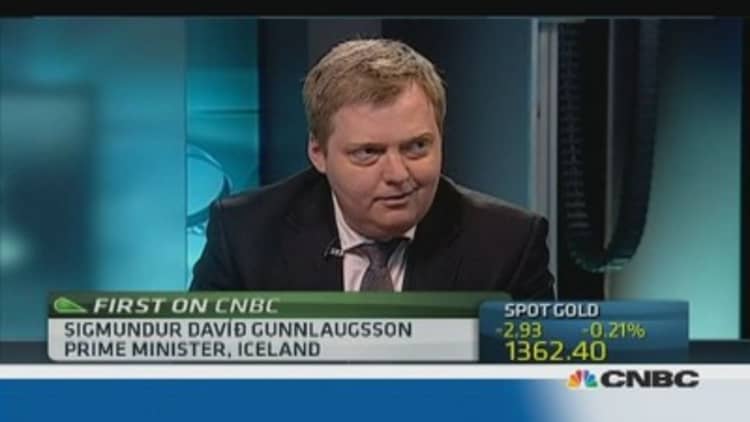
The euro zone hasn't learnt from the collapse of Iceland's banking system, and the tiny island country no longer wants to join the group, Iceland's Prime Minister Sigmundur Davíð Gunnlaugsson told CNBC.
"The euro zone hasn't learnt the lessons Iceland was forced to learn," Gunnlaugsson said.
"The European banks survived but haven't learnt from the experience. They are still functioning on the regulations that brought down the Icelandic banks."
He expressed concerns about "this continuing need to put in more and more leverage with no end in sight" and the "lack of consensus" in the European Union. European banks have gradually reduced their leverage ratios since the crisis, and are facing even tighter ratios of capital to assets under the Basel reforms.
Since gaining power earlier this year, Gunnlaugsson has dissolved Iceland's European Union negotiation committee, a clear signal that the country is no longer keen to join the union.
(Read more: Real winner of Iceland's election)
The EU and U.S. are Iceland's biggest export markets for its fish, and he said his biggest concern was about "uncertainty" in those markets.
Iceland became a byword for the high leverage which precipitated the financial crisis, with Michael Lewis's book Boomerang describing it as more hedge fund than country.
The island, whose economy is historically based around the fishing industry, became heavily involved in financial services in the decade preceding the credit crisis. Its three biggest banks owned assets equivalent to almost nine times the country's GDP at the end of 2007, and had borrowed heavily to fund their acquisition spree. When panic set in following the collapse of Lehman Brothers in 2008, they went into receivership.
Unemployment rose, growth shrank, and inflation hit 20 percent at one point. Yet there are signs the economy is recovering, with 1.9 percent growth in the first half of 2013 and unemployment back below 4 percent after hitting 10 percent at one point. Iceland's households and businesses have deleveraged significantly, with corporate debt now down to 150 percent of GDP, half the peak number.
Gunnlaugsson credits Iceland's independence from the euro zone for its return to growth.
"Most of these things have to do with being independent and being in a position to adapt," he said.
There are still concerns about the lack of diversity in an economy where fishing and aluminium account for 60 percent of exports. The government is trying to establish Iceland as a center for pharmaceuticals, bio-technology and data centers. Gunnlaugsson has been on a charm offensive around the world to encourage investment, meeting the U.S. President Barack Obama earlier this month and launching a free trade agreement with China in October.
(Read more: Chinese tycoon's plans for Iceland)
"The main problem has been lack of investment. We are trying to put some stability and predictability in place," Gunnlaugsson said.
The country's recovery "remains precarious", according to James Howat, European economist at Capital Economics. He pointed out that the krona, which has seen plenty of volatility this year, is still propped up by capital controls which stop foreigners selling their large balances of liquid krona assets.
Follow Catherine on Twitter: @cboylecnbc


